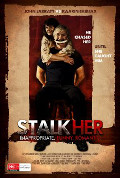
Directed by
John Jarratt / Kaarin Fairfax
90 minutes
Rated MA
Reviewed by
Bernard Hemingway

StalkHer
Synopsis: Jack (John Jarratt) is a stalker who breaks into the home of Emily (Kaarin Fairfax) only to find himself at her mercy.
The truism is that it is not what you say but how you say it that matters. Applied to John Jarratt and Kaarin Fairfax’s film, if the “what” has some potential interest, the “how” comprehensively negates it. The main problem lies with the crude and crudely feminist script, which takes the timeless conflict between men and women and renders it into a bondage game played out by a pair of middle-aged suburbanites trying to spice up their flagging sex lives.
From the get-go, when Emily throws that age-old symbol of female temptation, the apple, out her kitchen window to be picked up by a gallows-hooded peeping Tom, it is quite apparent that StalkHer is not really about a stalker and his victim but rather something akin to the rape fantasy in Josh Lawson’s 2014 sex comedy, The Little Death. The question in our mind as we embark on a journey of unremitting verbal and physical abuse is where is all this taking us. The answer is, not very far.
Roman Polanksi’s 2013 two-hander, Venus In Fur, was an insightful portrayal of the ever-shifting psychological dynamics of sex and gender roles in our free enterprise culture. Kristijana Maric’s Grand Guignol version of same has Jack’s caricatural Ocker misogynist spending most of the running time tied to a chair and, when not literally gagged by Emily, pouring a tirade of expletives on her head, occasionally flipping into fantasies of physically harming her. Emily is more playful, using her conventional gender image of nurturer to challenge Jack’s rage but equally, flipping into fantasies of physically harming him, the film in turn flipping back and forth between the two characters. All this may in an allegorical way have a good deal of truth to it. Probably most long term relationships end up with both partners harbouring murderous thoughts about each other. But beyond recommending role play as therapy, the film has nothing to offer on the apparently insoluble dilemmas of monogamy. In this respect it ends up being a mature-aged version of the gimmicky black slasher comedy, The Loved Ones.
The trouble with StalkHer is that it doesn’t get beyond a Punch and Judy level of articulation of its issues. Periodically, proceedings are punctuated with blaring Aussie pop songs from the likes of Split Enz and Skyhooks that function as a kind of thematically-related commentary but beyond that, the overall effect is one of monotony largely thanks to Jack’s inability to do more than to throw the C and F words around. This is not helped by the fact that Jarratt is not an actor who can convey emotion convincingly, something which is emphasized by the confined setting and the close quarter photography. Understandably, given Maric’s point of view, Emily is a far more sympathetic character and Fairfax’s performance as the frustrated female is consistently engaging but the film tends to reiterate the basic initial dynamic rather than dialogically develop it.
StalkHer is commendable for its economic production design and visual clarity, and the boldness and originality of its conception deserves some acknowledgement but frankly it’s hard to imagine anyone finding more positives than negatives in this under-developed production.

Want more about this film?


Want something different?




